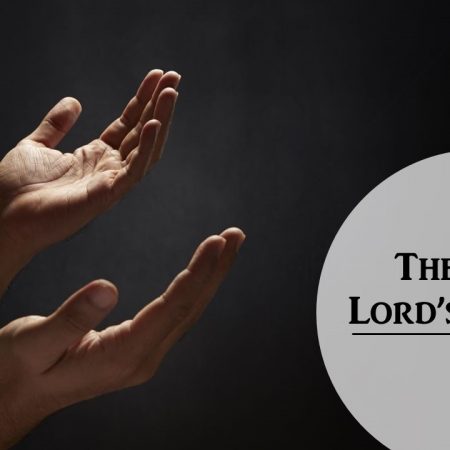
“I have manifested your name to the people whom you gave me out of the world. Yours they were, and you gave them to me…”
John 17:6b
We now come to something that is, without a doubt one of the key emphases of the contents of Jesus’ prayer – both for the apostles with him on the night of his betrayal and for his disciples of all time.
Notice how often this thought is repeated:
- v2: all whom you have given him [the Son]
- v6: the people whom you gave me
- v6: you gave them to me
- v9: those whom you have given me
- v12: which you have given me
- v24: whom you have given me
Even before Jesus expresses in prayer his desires for his disciples – and that doesn’t actually come until v11 – he gives us several descriptions of his disciples. We saw in the first part of this verse that Jesus’ disciples, both then and always, are those to whom the Son has made known the name and person of the Father.
Now we learn that true disciples are those who have been given to the Son by the Father.
Given the clear and repeated emphasis on this truth as demonstrated in those verses I have highlighted, you can imaging my surprise when I discovered that one of the commentaries I consulted on this passage completely fails to make any mention of the fact that the true disciples of Jesus have been given to him by the Father.
In this statement we are focussing on, we learn three immense truths about ourselves as Christ’s disciples which are as true of us as they were true of the small group of men that Jesus was primarily referring to in his prayer, the 11 remaining apostles.
Taking these truths in a sequential or chronological order we learn, first that before we were “given” to the Son we already belonged to the Father – “Yours they were”, says Jesus.
If we understand our being given to Christ as referring to the time of our conversion, our coming to faith in Christ as Saviour and Lord, then what Jesus says here tells us that even before we were converted, we already belonged to God.
How can that be, we might wonder. The explanation lies in the much hated but all-pervasive doctrine of election. Consider for example:
- “he (God the Father) chose us in him (Christ) before the foundation of the world” (Ephesians 1:4)
- Unbelievers are those “whose names have not been written in the book of life from the foundation of the world” (Revelation 17:8)
- “I have many in this city who are my people”, though as yet unsaved (Acts 18:10)
You and I who have come to saving faith in Christ – and all who will yet come to faith – were predestined and called and chosen to be saved, and therefore belonged to the Father, long before we came to faith.
Secondly, we learn that the Father gave us to the Son – “you gave them to me”. As MacArthur puts it, this idea “must be seen as a gift of the Father’s love to the Son.” [1]
Some of the most explicit teaching on this glorious truth comes earlier in John’s gospel, in chapter 6, where Jesus spells out both the sovereignty of this choosing and giving and the security that it entails.
“All that the Father gives me will come to me”, says Jesus in 6:37, and he will not turn away any of these ‘love gifts’. Neither will he “lose” a single one of these ‘love gifts’ from the Father (6:39).
And then we are told how the Father’s gift to the Son is effected. “…everyone who looks on the Son and believes in him should have eternal life” (6:40) and this work itself is the work of the Father, because, as Jesus goes on to say, “ No one can come to me unless the Father who sent me draws him.” (6:44)
We should also note briefly that, according to verse 10 of John 17, the ownership of disciples is reciprocal between the Father and the Son – “All mine are yours, and yours are mine.”
Then thirdly we see that the Father gave us to the Son “out of the world”. Jesus says almost exactly the same thing in 15:19 and it is important to understand how John uses and understands the word “world”.
“The ‘world’, or frequently ‘this world’, is not the universe, but the created order (especially of human beings and human affairs) in rebellion against its Maker….. In fact, the ‘world’ in John’s usage comprises no believers at all. Those who come to faith are no longer of this world; they have been chosen out of this world.”
Don Carson
When Paul describes the pre-conversion condition of the Ephesian believers, he climaxes with the phrase, “without God in the world” (Ephesians 2:12). That is what we are when we are outside of a covenant relationship with God. Before I became a Christian, I was a pagan. I lived according to the lifestyles and the precepts and point of view of the world in rebellion against its maker.
Why does Jesus stress the givenness of his disciples? Surely, at least in part, it is so that those who he is describing, and those for whom he is praying, would hear with their own ears the sovereignty of their election and therefore, as a direct result of that, the security of their election. After all, when he actual begins to pray as such, Jesus is going to be praying that the Father would keep them from the evil one (17:15) and because the world hates them.
And what was true for Peter, James and John and the others is every bit as true for you and me who are truly regenerate.
And what was true for Peter, James and John and the others is every bit as true for you and me who are truly regenerate.
[1] MacArthur, J. (2005). The MacArthur Bible Commentary. Nashville: Nelson p1374
[2] Carson, D. A. (1991). The Gospel According to John. IVP pp122-123
